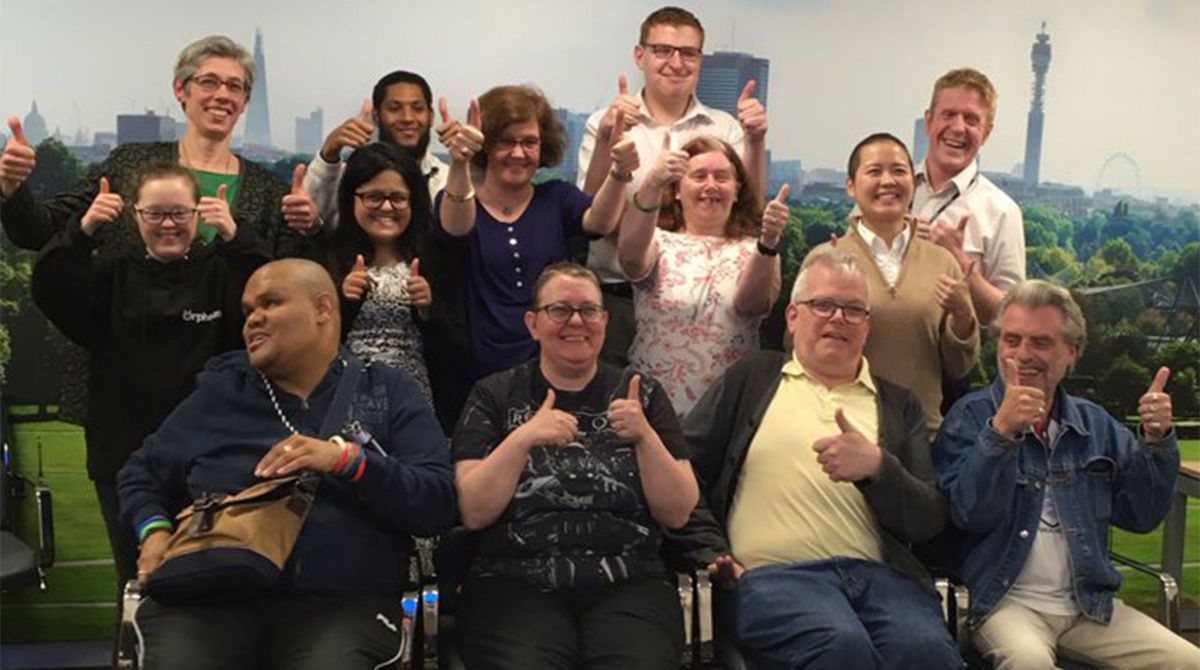Kingston University and St George's, University of London launch unique programme to help people with learning disabilities become researchers
Posted Thursday 27 February 2020
 The pilot course has allowed 10 people with learning disabilities to train as researchers.
The pilot course has allowed 10 people with learning disabilities to train as researchers.
A pioneering programme to help people with learning disabilities become researchers has been launched by Kingston University and St George's, University of London.
Funded by the National Institute of Health Research, 10 students took part in the eight-week pilot and learned through theory and practice about what research is, what different methods there are, how to conduct focus groups and how to make the best research questionnaire.
The idea for the initiative came from leading learning disability and palliative care expert at Kingston and St George's Professor Irene Tuffrey-Wijne who, having collaborated with people with learning disabilities as co-researchers and research advisers in the past, wanted to create a formal training programme that was accessible to all. "I've conducted a lot of research around palliative and end of life care and I've always made sure to involve people with learning disabilities as it's really important they have a voice," she said.
Professor Tuffrey-Wijne was impressed with the way the students became independent during the course by creating and seeing through their own research projects and seeing them through to completion. "This course has shown that people with learning disabilities are able and willing to do research. They chose a topic that was really important to them, which was investigating why more people with learning disabilities don't have jobs, and found that it's not a case they can't contribute to society but more that they don't get the chance – whether that's through not getting chosen for a job or even to the interview stage," she said.
One of the students on the course, Richard Keagan-Bull, reinforced this point and said people with learning disabilities aren't always seen and heard. "People shouldn't judge a book by its cover – you need to look inside to see what a person can do. It is good for people like myself to get the opportunity to go out in the world and to do the normal things that other people do," he said.
The course has had such an impact on the students that they have helped, along with Professor Tuffrey-Wijne, to write an article about it and its benefits which has been submitted to an academic journal.
After completing the course Shabnam Mohamed-Khan, one of the cohort, was offered a voluntary work placement with Croydon Mencap to research what activities adults with learning disabilities like to do.
Another student, Bernie Conway, works as a people administrator at Mencap, a charity supporting people with learning disabilities, and said the course has helped develop her interviewing skills – something vital for the role. "I'm part of an interview panel that is made up solely of people with learning disabilities and this is so important because it gives people more of an understanding of what people with learning disabilities can do and shows off what Mencap does and stands for as an organisation," she said.
Due to the success of, and interest in, the course Professor Tuffrey-Wijne is now hoping to offer it on a regular basis – if extra funding can be sourced. "It's gone even better than I could have imagined but this eight-week pilot was only an introduction to research. The students have expressed a huge interest in wanting to learn even more and, after seeing what they can do in such a short space of time, it would be amazing to offer this more widely and give people with learning disabilities the chance to become researchers and make a difference for future generations," she said.
- Find out more about studying learning disability nursing at Kingston University and St George's, University of London.
- Find out more about research at Kingston University.
Contact us
General enquiries:
Journalists only:
- Communications team
Tel: +44 (0)20 8417 3034
Email us



